As an Amazon Associate, we earn from qualifying purchases. This does not affect the price you pay or the quality of the products you buy. For more information, please read the full affiliate disclosure here.
When it comes to power generation, either solar power energy or any other energy, wattage is a prominent determinant factor that distinguishes the capability of a generator. Therefore, getting to know about it defines the power and the level of performance you should expect from a generator.
Furthermore, when purchasing a high-wattage generator, knowing the top choices available in the market and their specifications can facilitate a more informed decision. These generators play crucial roles in areas like heavy-duty industries, large residential buildings, and emergencies.
However, while investing in these high-wattage generators, it is imperative to recognize their safety precautions and maintenance requirements to secure the best efficiency and longevity. Therefore, it’s equally important to weigh the pros and cons of these powerhouses to make a decision that suits your requirements and budgets optimally.
Henceforth, in this article, we reviewed the best high-wattage generators on the market today and explained why they are the best.
The Best High Wattage Generators: Our Top Pick
| Best Overall | Generac GP15000E | ★15,000 running watts and 22,500 starting watts. ★Electric start with battery included. ★Large fuel tank for extended run times. ★Low-oil shutdown feature. ★GFCI outlets for added safety. ★Mobility kit for easy transportation. | Check Out Recent Price On Amazon |
| Best For Job Site | Duramax XP15000EH Dual Fuel Generator | ★Dual fuel capability (runs on both gasoline and propane). ★12,000 running watts and 15,000 starting watts. ★Electric start with recoil backup. ★Low-oil shutdown and automatic voltage regulation. ★Heavy-duty steel frame and durable construction. ★Wheel kit and handles for portability. | Check Out Recent Price On Amazon |
| Best For Outdoors | CAT RP12000E | ★12,000 running watts and 15,000 starting watts. ★Electric start with wireless remote start capability. ★Rugged and durable design with steel frame. ★Low-oil shutdown and automatic voltage regulation ★Multiple outlets, including GFCI and twist-lock options. ★Mobility kit for easy movement. | Check Out Recent Price On CAT |
| Best For Home Backup | Honda EB10000 | ★Durability for heavy-duty tasks. ★Commercial-grade OHV engine. ★9000W running, 10000W peak power. ★Up to 7.2 hours runtime at 50% load. ★Quiet operation. ★Advanced cooling system. ★Multiple outlets ★Voltage regulation | Check Out Recent Price On Amazon |
What’s High Wattage All About In Generator? Why Does It Matter?
Wattage is a primary indicator of a generator’s power and capability; it significantly influences its overall functionality and performance.
Wattage is defined as the rate at which electrical energy is absorbed or produced. It is quantified as one joule per second.
Notably, a generator’s wattage dictates how many appliances or what kind of electrical circuit it can support efficiently.
To determine a generator’s wattage, you need to consider two forms: running (or rated) watts and starting (peak or surge) watts.
Running watts are the continuous watts needed for appliances or devices to operate. In contrast, starting watts represent the extra watts required for two to three seconds when an appliance starts up.
When choosing a generator, it’s essential to account for running and starting watts to ensure the generator can support the initial power surge when devices start up.
High wattage generators are made with advanced engines with the capacity to meet high-power demands.
For residential purposes, generators can have an output of up to 20,000 watts. In comparison, commercial and industrial generators have capacities exceeding 150,000 watts.
These robust generators are commonly utilized in environments requiring substantial power, such as businesses, construction fields, or large-scale events.
The primary advantage of high-wattage generators is their ability to fuel many appliances and heavy equipment.
These features are essential during power blackouts or emergencies, ensuring that vital appliances at home keep operating or at an off-grid event where many amenities need to be powered concurrently.
However, these generators have their drawbacks, including:
- Higher purchase cost
- Increased fuel consumption
- And higher operational costs.
Additionally, they are often larger and produce more noise which may be better for those with more minor power needs, noise sensitivity, or budget constraints.
Inspecting your power needs is crucial when choosing a generator based on wattage.
Evaluating the type and quantity of appliances you need to operate continuously, and understanding the effects of running and starting watts on a generator’s performance, can facilitate an informed decision on the right generator.
Your unique situation must determine whether it necessitates a high wattage generator or a generator with lower wattage.
The Best High Wattage Generators in the Market
Here are our top-picked high-wattage generators in the market.
1. Generac GP15000E
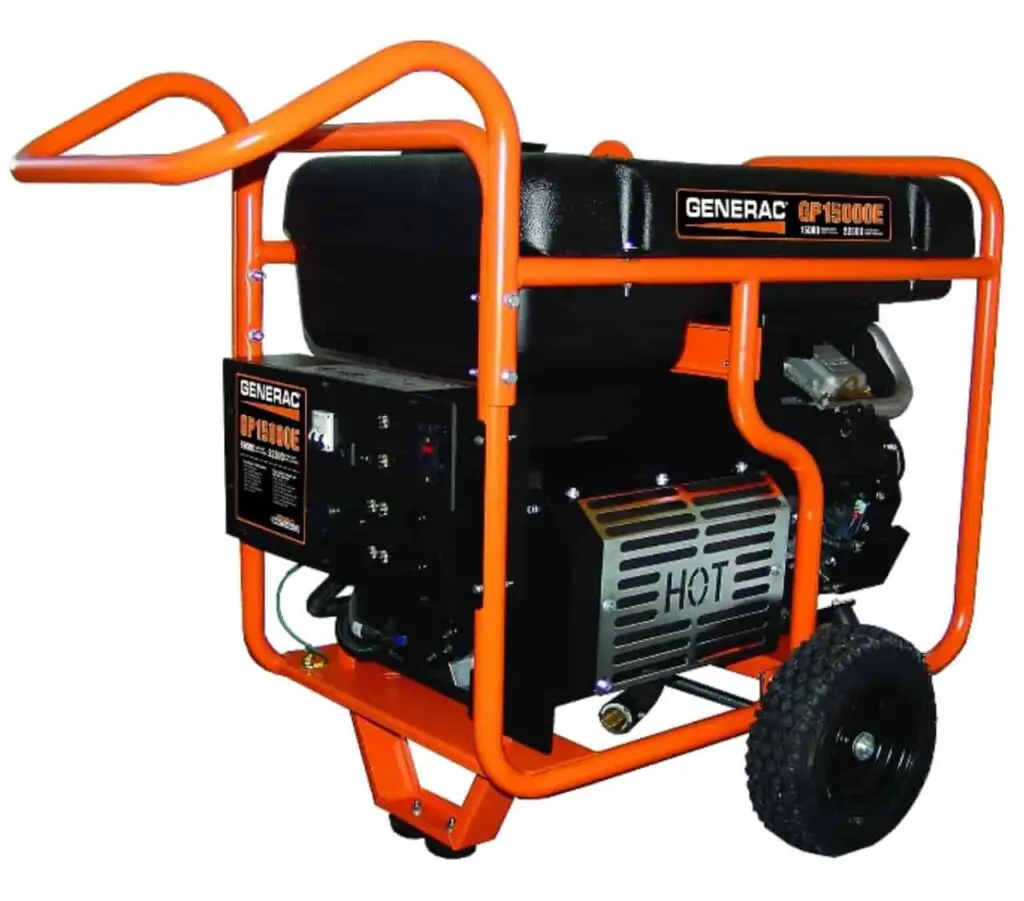
Best Overall
features
- 15,000 running watts and 22,500 starting watts.
- Electric start with battery included.
- Large fuel tank for extended run times.
- Low-oil shutdown feature.
- GFCI outlets for added safety.
- Mobility kit for easy transportation.
The Generac GP15000E is one of the highest-wattage generators on the market. It boasts a 15000-watt running power and a peak of 22500 watts, making it suitable for powering several heavy-duty appliances simultaneously. Powered by a 22.5 HP engine, this unit also offers impressive fuel efficiency, consuming approximately 1.5 gallons per hour at 50% load.
2. DuroMax XP15000EH Dual-Fuel Generator
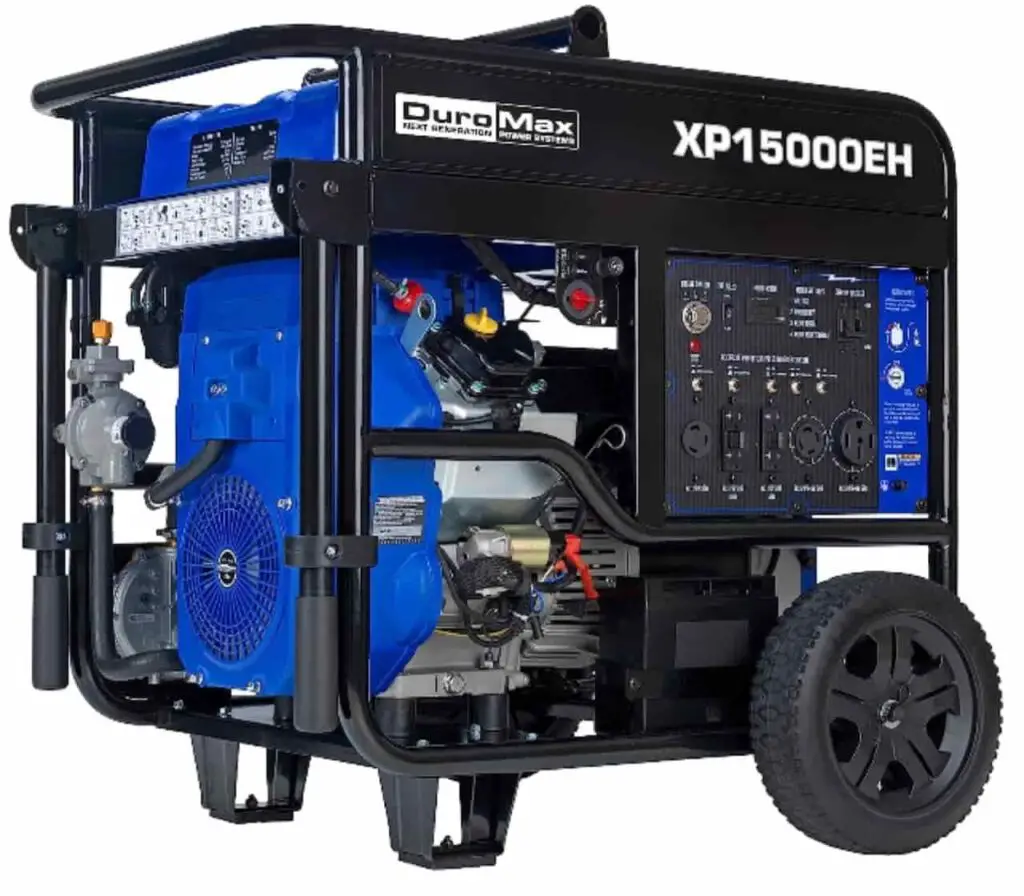
Best For Job Sites
features
- Dual fuel capability (runs on both gasoline and propane).
- 12,000 running watts and 15,000 starting watts.
- Electric start with recoil backup.
- Low-oil shutdown and automatic voltage regulation.
- Heavy-duty steel frame and durable construction.
- Wheel kit and handles for portability
The DuroMax XP15000EH, with its peak power of 15000 watts and a running output of 12000 watts, is a high-wattage generator that stands out for its dual-fuel capabilities. This feature allows the generator to run on either gasoline or propane, offering flexibility according to the availability of fuel. At 50% load, it can run for 9 hours on a full gasoline tank and even longer on a standard propane tank, offering both longevity and versatility in power supply.
3. CAT RP12000E
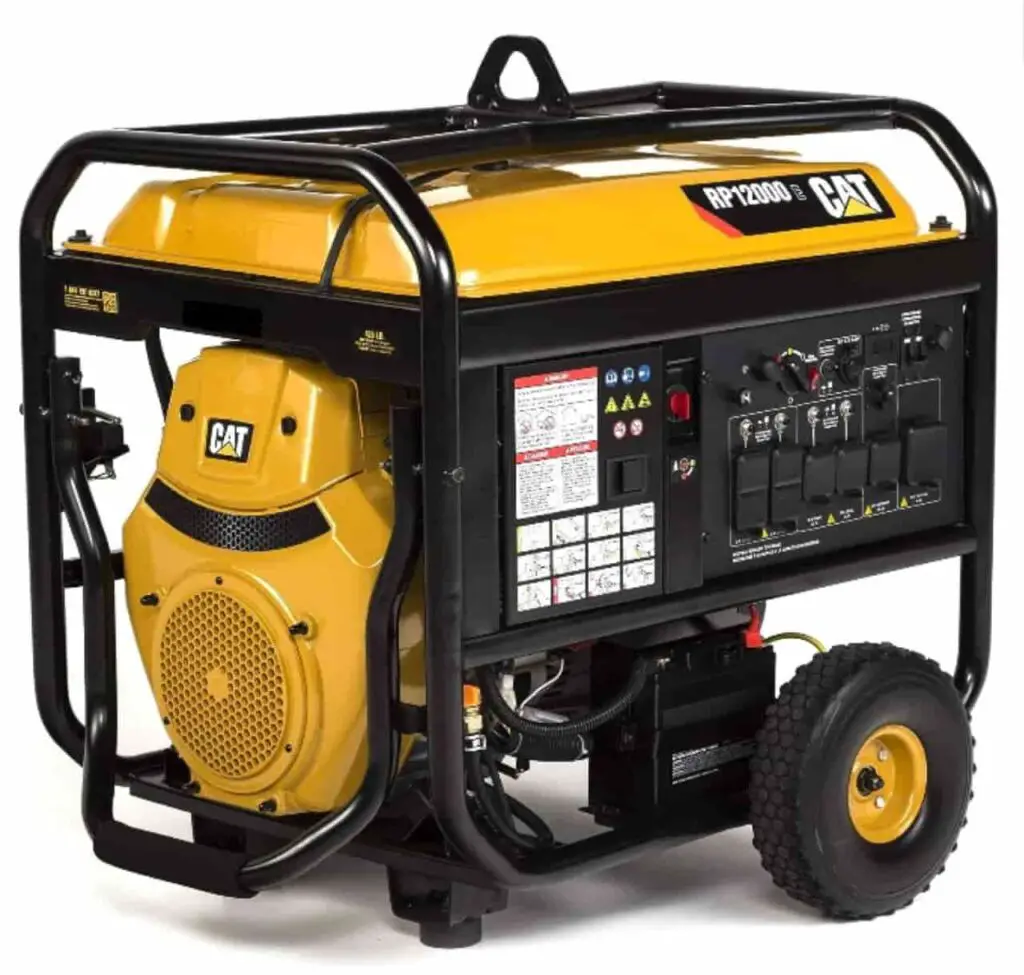
Best For Outdoors
features
- 12,000 running watts and 15,000 starting watts.
- Electric start with wireless remote start capability.
- Rugged and durable design with steel frame.
- Low-oil shutdown and automatic voltage regulation
- Multiple outlets, including GFCI and twist-lock options.
- Mobility kit for easy movement.
The CAT RP12000E is a close competitor, offering a continuous power output of 12000 watts and peaking at 15000 watts. It’s powered by a 670cc V-Twin OHV motor, providing higher fuel efficiency and longer running time. The RP12000E can run up to 11.7 hours at 50% load on a single 13.2-gallon gas tank, an impressive feature when considering fuel efficiency.
4. Honda EB10000
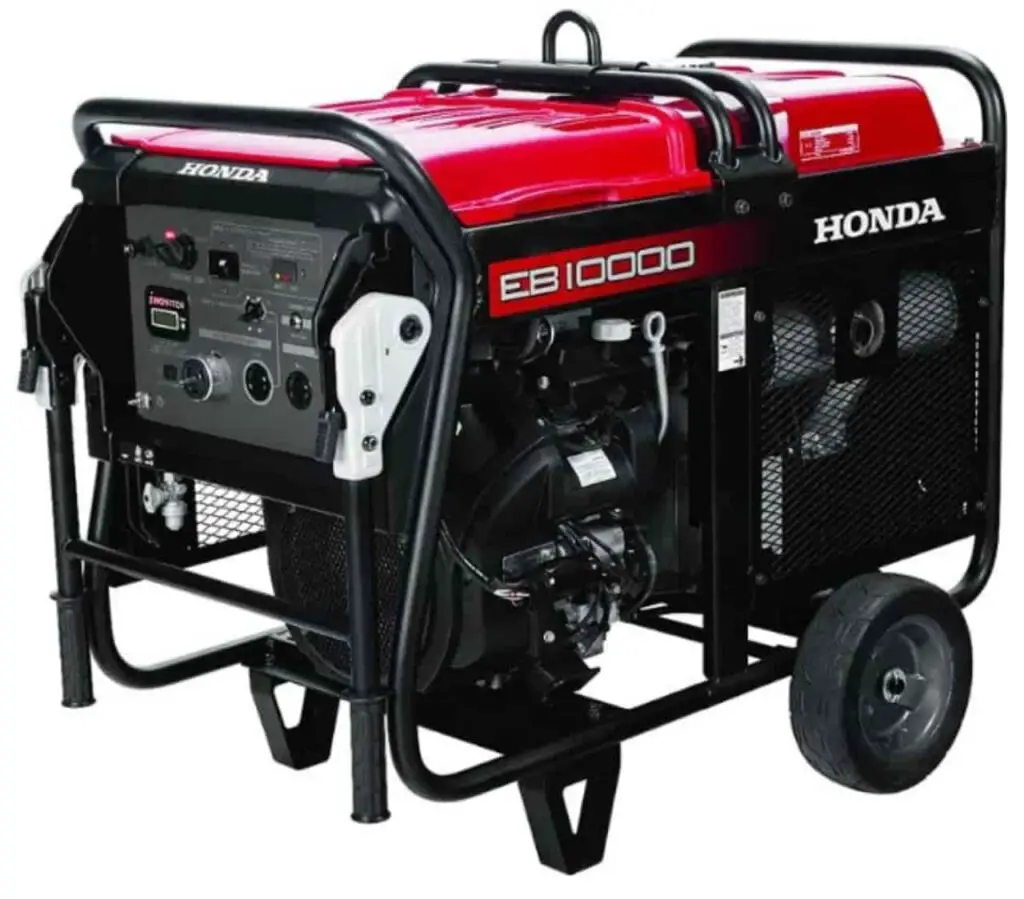
Best For Home Backup
features
- Durability for heavy-duty tasks.
- Commercial-grade OHV engine.
- 9000W running, 10000W peak power.
- Up to 7.2 hours runtime at 50% load.
- Quiet operation.
- Advanced cooling system.
- Multiple outlets.
- Voltage regulation.
The Honda EB10000, though slightly lower in power output than the other generators mentioned here, is noteworthy for its durability and reliability. It’s sufficient for various heavy-duty applications, offering a running power of 9000 watts and peaking at 10000 watts. Honda’s commercial-grade OHV engines are known for their durability and can run up to 7.2 hours at 50% load.
Pros and Cons of High Wattage Generators
Like every other generator, high-wattage generators also have pros and cons. Here are some of the disadvantages and advantages of using high-wattage generators.
1. Reliable Proficiency of High Wattage Generators
Exhibiting extraordinary capability to power multiple demanding electrical appliances simultaneously, high-wattage generators are renowned for their unrivaled efficiency.
This prowess makes them the go-to power solutions for settings necessitating high quantities of electricity, including construction zones, grand events, or residential areas during power disruptions where many appliances must function concurrently.
With ease, they proficiently manage heavy-duty items such as refrigerators, HVAC systems, and electric ovens, among others, mitigating any concerns of overloading.
2. Cost of High Wattage Generators
While they’re prized for their capacity to generate large amounts of electricity, high-wattage generators generally come with a high initial purchase cost.
Their sheer power and longevity can justify this cost. However, for individuals or situations that only need a generator occasionally or for powering fewer appliances, investing in such high-capacity generators may be costly.
In addition to the initial cost, these generators’ maintenance and repair costs can also be high due to their complexity and the need for specialized parts.
3. Noise Levels of High Wattage Generators
One downside to high-wattage generators is their noise level. The large engines required to produce high amounts of electricity often result in louder operation.
The noise can become an issue in residential areas where it may disturb the peace or violate noise ordinance laws.
Some modern high-wattage generators have addressed this issue by incorporating sound-dampening technology. However, these models tend to be more expensive.
4. Fuel Consumption of High Wattage Generators
High-wattage generators consume more fuel due to their larger engines.
The type of fuel required will depend on the specific model, with some using gasoline, others diesel, and some models offering a dual-fuel option.
The cost of fuel can quickly add up, especially during prolonged use. Therefore, potential owners need to consider the fuel cost in addition to the purchase price of the generator.
Applications of High Wattage Generators
Mining, construction, and manufacturing sectors often run energy-intensive machinery that necessitates high-wattage generators.
With these industries, power disruptions can lead to enormous financial repercussions. They install substantial generators capable of delivering significant power outputs to prevent such scenarios.
These powerful generators can fuel heavy-duty machinery like excavators, crushers, grinders, and conveyor systems.
Their continuous and reliable power ensures steady production line operations. In addition, these high-powered generators are more than a luxury in remote sites where the primary power grid is unreachable — such as in mining fields and construction sites. They are, indeed, a lifeline.
High Wattage Generators and Large Residential Buildings
Large residential buildings such as apartment complexes, condominiums, and sprawling villas also rely on high-wattage generators.
Such buildings have substantial power requirements due to the numerous electrical appliances and systems they have in place.
This includes lighting, heating, cooling, elevators, and other household appliances.
In a power outage, a high-wattage generator ensures that essential services like lighting, heating or cooling, and elevator operations are not interrupted.
They can also power individual units, allowing residents to use essential appliances during power interruptions.
Some large residential buildings maintain their power supply grid, but a high-wattage generator is a backup for emergencies.
Emergency Applications of High Wattage Generators
In emergencies such as natural disasters, high-wattage generators are often deployed.
These generators provide the power necessary for rescue operations, including lighting, operation of heavy machinery for rescue work, and power supply for emergency medical services.
They are also used in facilities that cannot afford power losses, such as hospitals, server farms, and data centers.
For instance, a power outage in a hospital could mean life or death for patients on critical support systems. High-wattage generators ensure a constant power supply to these vital machines.
Lastly, high-wattage generators often power massive lighting rigs, sound systems, and video screens during public events.
A failure in the power supply during such events can cause disruptions and safety hazards, making high-wattage generators a vital component in event management.
Safety Considerations for Handling High Wattage Generators
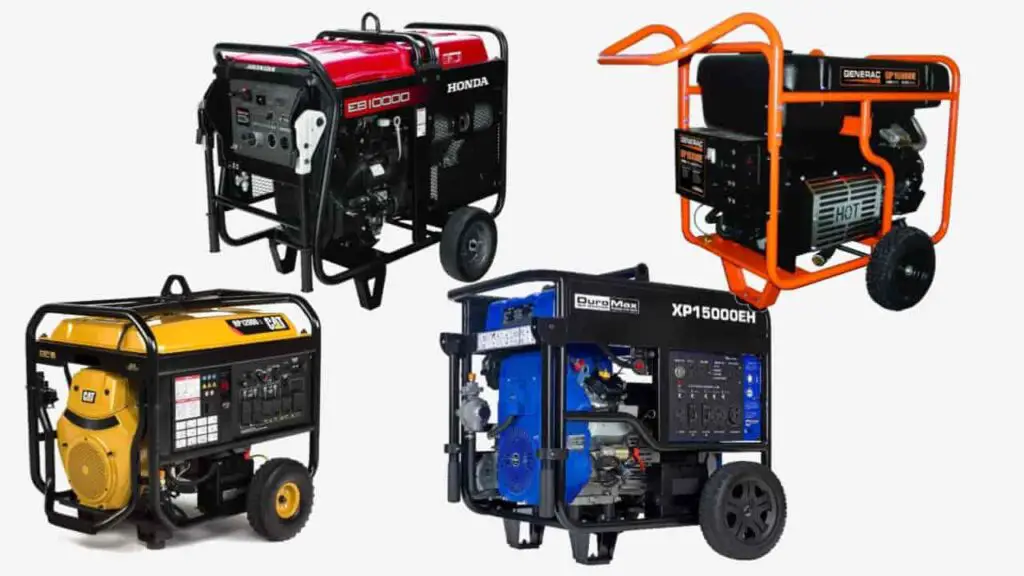
Users must know the appropriate safety measures to effectively use high-wattage generators, which often offer a power output exceeding 1000 watts. Improper or reckless usage of these powerful machines could cause severe injuries and death.
One recommended safety tip is to position your generator outside your domicile or functional area at a respectable distance, thus minimizing the risk of lethal carbon monoxide leaks. Long, robust, outdoor-rated cords are suggested to connect appliances and electronic devices to your generator.
Overloading the generator must be avoided to prevent the outbreak of fires or damage to connected appliances. A correctly rated circuit breaker can also be critical in preventing electrical accidents. In addition, we strongly advise against refueling the generator while it’s still running. If you need to add more fuel, switch off the generator and wait for it to cool down to prevent any fire outbreak.
Maintenance Tips for High-Wattage Generators
Maintenance plays a vital role in high-wattage generators’ efficient performance and longevity. Regular inspection is an integral part of generator maintenance. Check for any leaks, loose bolts, corrosion, or other signs of wear and tear.
Routine oil changes are necessary to ensure the generator’s smooth running. The manufacturer’s manual usually provides the recommended oil contributions. Air filters should also be cleaned regularly and replaced when necessary.
Generator batteries, like car batteries, can drain or lose charge over time, mainly if the generator is not used for extended periods. It’s advisable to charge the battery at least once every three months. For any significant issues or replacement parts, a professional or manufacturer warranty service should be sought.
Attempting significant repairs or servicing without proper knowledge or tools is not recommended. Lastly, store your generator correctly when not in use. Cover it to protect it from dust and moisture.
Final Thought
The benefits of a high-wattage generator outweigh the potential drawbacks for a business or event that requires a large amount of power. However, for home use or smaller operations, a smaller and less powerful generator that is more fuel-efficient and operates more quietly may be a better fit. A more in-depth look reveals many options for high-wattage generators. The Generac GP15000E and DuroMax XP15000EH rise to the top with their robust power output capabilities. The CAT RP12000E and Honda EB10000 also shine due to their energy efficiency and dependability. Before settling on a purchase, evaluating your situation’s specific needs in terms of power necessity, operational costs, and probable usage duration is essential.
🔌 Generator Tools & Social Hub
Maximize your generator knowledge! Use our calculators and join our community for expert tips:
Stay connected for updates and exclusive content:
📘 Facebook Page 🐦 X (Twitter) 📌 Pinterest 🔒 Private Facebook GroupDiscover more from Generator Hacks
Subscribe to get the latest posts sent to your email.


